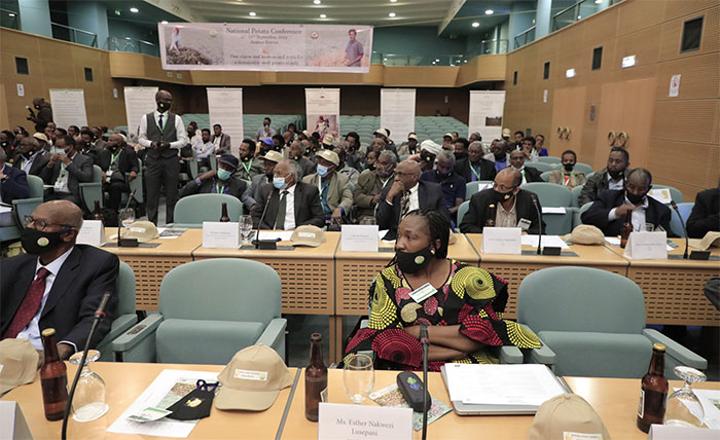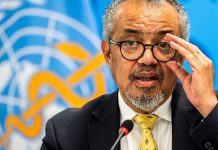Africa-Press – Eritrea. An Event that is expected to pave the way for Eritrea to be a regional seed potato producer
The Ministry of Agriculture (MoA) hosted a National Potato Conference (NPC) in which senior researchers, experts and scientists from Eritrea and other countries presented a total 18 papers. The NPC which was convened at Asmara Palace from 21- 22, September 2022, was the first of its kind for the country and, shed light for a more concerted effort among regional and international organizations to boost potato production in Eritrea.
The NPC which was organized under the theme ‘One vision and harmonized work for a sustainable seed potato supply’ was attended by the Minister of Agriculture H.E Arefaine Berhe; FAO country representative, MoA and Zobas high level officials, ASARECA senior officials, IPM representative, VITA CEO, senior CIP representative, and a number of ministry and zoba experts.
Day 1 Sessions
Mr. Tsegay Berhane, Director General of the National Agricultural Research Institute (NARI), in his opening speech, commended all participants from inside and outside the country for making time to attend the conference, and highlighted the importance of such a conference in reinforcing the integration of national, regional and international efforts to improve potato production.
Then after, Mr. Yoel Yonas, representing the planning and statistics division of the Ministry, presented an overview on the general agricultural policy and strategy of Eritrea. Following, Mr. Medhanie Mehari, Head of Horticultural Research at NARI and technical coordinator of the conference presented a paper entitled; ‘Potato importance, status and varieties in Eritrea.’ Other papers on ‘Important Diseases and Insect Pests of Potato in Eritrea’ as well as ‘Mini-tuber Seed Potato Production in Eritrea through Tissue Culture’ were also presented by Mr. Michael Yakob and Mr. Mussie Fekadu respectively.
According to these three presentations, potato is a very nutritious, climate smart and rewarding agricultural commodity, and is globally ranked 3rd in terms of its production and consumption. It was also noted that potato has joined the top five agricultural products in Eritrea in the year 2021 by yielding on average 16 tonnes per hectare.
Moreover, the papers stated that there are more than 7,000 small and medium scale horticultural crop farmers, and about 4000 vegetable farmers in the main potato growing areas.
One of the presentation stated that the history of potato in Eritrea goes back to the Italian period (1891-1941) and later, different varieties were introduced from Europe and Ethiopia. The old farmer’s cultivars include Sheshemene, Tsaeda Embaba and Keih Embaba. Even though, through time, the farmer’s cultivars were replaced by the lately introduced European varieties, they have still high genetic diversity, the presentation outlined.
The presenters also expressed that so far, more than 70 varieties of potato have been imported for adaptability trials, and NARI has tested and recommended 13 high performing potato varieties at different times. The varieties include Cosmos, Picasso, Zafira, Condor, Ajiba, Spunta, Temet, Banba, Burren and Electra. Currently, it is Electra – the Teagasc bred Irish Potato Marketing Group (IPM) variety which is the dominant potato variety, the presentations stated.
Moreover, the papers outlined that the average yield under farmers’ conditions is 16 tonnes per hectare, and is still considered as low when compared to the global average which is 23.9 tonnes per hectare.
Prevalence of viral diseases are reported to be the major causes of yield losses. To overcome these problems, production of virus-free seed potato through tissue culture started at the National Agricultural Research Institute in collaboration with a number of development partners; one of the presentations elaborated.
Thermotherapy in Potato virus Elimination in Tissue culture by Prof. Tadesse Mehari; CIP Strategy in Developing and Promoting Seed potato with National Partners and Experiences by Dr. Monica Parker; Seed potatoes: The impact and challenges for small scale farmers in Kenya and East Africa by Mr. Derek Roulston from IPM were the papers presented during the morning session.
Papers entitled ‘Farmer Based Potato seed Multiplication in the Screen house to Improve Early Generation Seed Access in Gamo Zone, South Ethiopia’ by Tadele Girma from Vita-Ethiopia, and ‘Impacts of Potato Seed project (2015-2021)’ by Tesfay Zekarias from Eritrea-Ireland Development Partnership (EIDP) highlighted success stories of potato production in the respective countries.
Potato seed, production, distribution and marketing in Eritrea by Ms. Genet Gebrezgabhier, Practices and Experiences on Potato Seed Certification in Eritrea by Mr. Said Nuredin; The Response of Potato Tuber Yield to the Application of Fertilizers: Case Studies in Eritrea by Mr. Dermas Sultan from NARI; Deficit Irrigation for Maximum Water-use Efficiency – Review by Dr. Araya Zeray were also the papers presented before the end of the first day session.
Participants thoroughly discussed the papers and enriched them with valuable comments and suggestions.
Day 2 Sessions
During the day-two morning session, papers on Irish Potato Coalition in Ethiopia by Mr. Mesfin Kebede from Vita-Ethiopia; Potentials of potato production in the lowlands of Eritrea: A case study by Mr. Ermias Asmelash; Hamelmalo Agricultural College potentials to Contribute in Seed Potato value chain by Dr. Brhan Kiar – HAC were presented consecutively. Following, Mr. Fitsumbrhan Gebremeskel, a Ph-D candidate NARI Staff from University College of Dublin virtually (by a video) presented a paper with regards to Strategic Interventions to support the Development of Seed potato systems in Eritrea.
Finally, a Five-year Potato Seed Country Strategy was presented by Mr. Medhanie Mehari. This presentation outlined nine important strategic pillars to sustain seed potato production in the country in a harmonized and sustainable way.
It is also to be noted that two video presentations and a number of posters that show Eritrea’s experience and farmers’ success stories were presented during the two-day conference. In addition, three model farmers representing the seed potato project beneficiaries presented their experience and the benefits they gained from the MoA and its development partners. All the farmers witnessed that the seed potato they got from the Ministry were disease free; resistant to pests and more importantly highly productive that turned a new page in their livelihood.
During the conference, exemplary Zoba, Sub-zobas and farmers were awarded for their outstanding contribution in the country’s potato production.
Towards the end of the two-day conference, Keynote speeches were delivered by Mr. Iyassu Gebretatios, EIDP country director, Dr. Denis Griffin – Teagasc Representative and also by Mr. John Weakliam-Vita CEO. All these speakers commended the Ministry’s endeavors and called on for more collaborative work to boost the country’s potato production and reach at the global average and/or beyond in a short period of time.
Finally, His Excellency Mr. Arefaine Berhe, the Minister of Agriculture made the following concluding remark.
Mr. Chairman
Distinguished Participants from
CIP, Teagasc, Vita, ASARECA
Ethiopia, Kenya and Tanzania;
Senior Government Officials;
FAO Resident Representative;
Deans of Hamelmalo and Science Colleges;
Invited guests;
Ladies and Gentlemen;
It really gives me great pleasure to warmly welcome you all to Asmara and especially to those coming from outside Eritrea to this maiden National Potato Conference. In the presentations of yesterday and the morning of today, we have covered a large territory on Eritrea’s experience in potato trials, production, distribution, regulation and marketing. More significantly, we have had presentation from the potato god-father or mother – the CIP, our long-time close partners in potato promotion and development Teagasc and Vita, from our regional research umbrella ASARECA and our regional would-be partners Ethiopia, Kenya and Tanzania.
Mr. Chairman,
Ladies and Gentlemen,
As Eritrea is only on the first step of the ladder in terms of potato production and even more so on productivity your combined assistance is absolutely crucial for us. As we all know and appreciate, potato is the third most consumed crop globally because of its economic and nutritional value. In Eritrea it is number five. Our final destination is, therefore, to produce potatoes in abundance throughout the country and throughout the year to make it accessible to every Eritrean at an affordable price at all times.
To do this, we have to make trials on different varieties that can thrive in the highlands and lowlands. We have barely started production of table potatoes in the lowlands last year with very encouraging results. However, we need to do more and especially with varieties that are developed by CIP for that kind of climate. Our expectation from our long-time partners is to increase the scope and depth of our cooperation. From CIP, we expect to get focused training, technical assistance and especially planting materials with very high quality, short duration for both the highland and lowland. I am glad that Dr. Monica raised the issue of sweet potatoes as well. That is a priority crop for us as we are seriously working to tackle the incidence of any malnutrition in children under 5 years of age. For this, we need high-quality and nutritious planting material with short cycle production.
Mr. Chairman,
Ladies and Gentlemen,
Considering our modest experience and the cooperation we get from our long-term and new partners, our first priority is to articulate the next five-year strategic plan in the areas of research, extension, regulation and capacity building.
Production in quantity and quality will take a center stage. However, value addition will also be given its due attention.
For this to happen production of healthy quality seed potatoes is the bottom line and we will endeavor to reach this height, hopefully, in the next five-year cycle. To this effect, we take good note of the strong recommendation made regarding importation of seed potatoes. We will focus, as much as possible, on producing clean and safe seeds through our tissue culture technology to avoid unnecessary contamination.
Dear participants, as you saw in some of our posters, we are giving utmost emphasis to the production, refinement, regulation and wide distribution of solid and liquid bio-fertilizers and bio-pesticides in order to attain our final goal of ensuring safe and nutritious food security. I am sure we can all appreciate that we cannot have sustainable development without caring for the environment.
In conclusion, I would like to acknowledge the tireless and effective work of the Ministry staff at the headquarters and zobas and especially the farmers who are the engine of development.
I would also like to take this opportunity to extend my profound gratitude to our long-time development partners Teagasc and Vita, our regional research network coordinator ASARECA, The International Potato Center (CIP) and our regional partners Ethiopia, Kenya and Tanzania. Your participation and constructive contribution is highly appreciated.
However, I cannot end my concluding remarks without acknowledging the fundamental contribution of a great friend and a devoted professional Dr. John Burkes who turned the chapter of potato production in Eritrea.
Finally, please allow me to commend the organizers of the conference for a job extremely well done.
Thank you for your attention!
After the conclusion of the conference and the field trips, the Public Relations Division conducted interviews with some participants who represented regional and international organizations. The summary of their comments and suggestions about the conference are as follows;
My Name is John Weakliam. I am VITA CEO. I know Eritrea very well because I lived here from 1994 to 2007 working with Eritrea-Ireland Development Partnership (EIDP).
The Eritrea-Ireland Development Partnership involved the MoA, Vita and Teagasc (Irish State Agriculture Research Extension and Training Organization) in the Potato Development Program, and particularly in the seed potato in introducing new varieties like the Electra. We also work together in a number of capacity development programs both for agricultural experts and farmers.
When it comes to potato production, Eritrea has made exemplary progress in the last 7 years with very limited resources thanks to the efforts of the brilliant young staff in the Ministry of Agriculture, Zoba experts and farmers. What we saw this week was full collaboration, professionalism and brilliant presentations. This demonstrate that Eritrea has done more with very limited resources than any country I know in East Africa.
Eritrean Ministry of Agriculture has developed a fantastic strategy, a road map for the next 5 years, and with capable people with in the Ministry & in the Hamelmalo Agricultural College. The Road-map has got 9 work packages that show how Eritrea can become fully self-sufficient in Seed Potato. Its road map involves technical assistance, introduction of new varieties, construction of storage facilities, training of farmers and international collaboration.
Eritrea is growing rapidly to get away from dependency on imported seed. I think in 5 or 10 years, Eritrea may be a big surprise and a big support for the whole of East Africa where there are 4 million potato farmers.
The conference was organized so that all the different actors come together and share their experience, develop more collaboration and networking. Finally, on behalf of all the people who came from overseas, I think we all had a wonderful time, we, very much appreciate what we saw, and we are ready to work with the Ministry in anyways.
My name is Enock Warinda, Executive Director of the Association for Strengthening Agricultural Research in Eastern and Central Africa (ASARECA). Eritrea was one of the 14 founding members of the association in 1994. Since then, we have been engaged in a number of collaborative projects in natural resources, water productivity and in Seed development like pearl millet and sorghum.
When we got invitation for this potato conference, we were very excited. Hence, the chairman and I decided to come. Subsequently, we have gained a lot of lessons from the conference; and as an organization we will use Eritrea’s experience in other countries like Ethiopia, Sudan, South Sudan, Rwanda and Burundi. We have also identified the country’s advantages and gaps in capacity building. Since we have member countries which have the same Agro-ecology with Eritrea, we have identified a lot of cooperation areas.
From the conference presentations, we can understand that the Ministry has a lot of intelligent and committed youth, including females. All these tell that Eritrea has got a secure platform of sustainability and bright future in the potato sub sector. Generally, I am very much impressed by everything I saw in the country.
I am Dr. Monica Parker, a senior scientist at the International Potato Center (CIP) – Africa Potato Program leader based in Nairobi, Kenya. Our organization has been doing a number of commendable works with NARI to develop the potato sub-sector in terms of capacity development, introduction of new varieties, seed system development and other technical matters.
This is my first time to visit Eritrea and I have got opportunities to explore a number of areas in which we can work together.
What we have learned from this conference is that the Eritrean government in general and the Ministry of Agriculture in particular are carrying out incredible works. A lot has been done with a very little resource. Potato is an important crop that can feed many people; and the government is doing its best to alleviate the obstacles in potato production that are preventing to meet the real potential. I visited some fields and the laboratory; they are really fantastic. I also saw Adi-zarna potato seed store; it is a good progress.
From this conference, we have also identified in which area we can collaborate with the ministry. Now, I have full picture of the country’s potato sub-sector.
Most importantly, I got a chance to meet some farmers; and learned that Eritrea’s average yield is 13-16 tonnes per hectare; and this is really promising because in most African countries the average is 8-12 tonnes per hectare. For Eritrean farmers to reach the global average, they need access to disease-free clean seed. Hence, I suggest proper and sustainable seed potato production, quality assurance and selection of good varieties to accelerate potato production in Eritrea.
Within these few days, I was really impressed by the capacity who are leading the country’s agriculture sector, the researchers and technical personnel towards safe and nutritious food.
My name is Derek Roulston. I came from Ireland, and I am here on behalf of the Irish potato coalition which is a platform setup to share information from a number of countries. Currently, we are working with Eritrea, Ethiopia, Kenya, Uganda, Tanzania, Malawi and Mozambique. In addition, I also represent IPM group which is a company based in Dublin. IPM potato group is licensed for Electra and Baren and both have been successful in Eritrea.
When I evaluate the country’s endeavors, here there is a huge room to expand potato production in to other areas through your lowland experimental program. Moreover, there is a huge potential to increase the yield not just to 24 tonnes per hectare but much higher. I can see 30 to 40 tonnes per hectare is achievable here.
In addition, Eritrea is free from a number of potato diseases and pests that are challenging many countries. So, it has to protect its land from being infected by illegal importation of seeds. For that matter, your bio-security needs to be strong; farmers should be aware about what is happening in other countries due to imported diseases and pests.
I also think that Eritrea has the ability to become seed producer not just for its own farmers but can also be a regional seed producer. Since there is high demand for seed in your neighboring countries, you can really capitalize by focusing in seed, and there are many ways in which you can accelerate it. I think you have all the ingredients here and it is just about scaling them up and going to the next level, and I am sure that it will happen very quickly. I am excited to be here at this stage and, look forward to seeing what will happen in the next four to five years.
Finally, I want to mention that we are now living in a global village. We look forward to invite you to Ireland to see the breeding program and understand how Irish agriculture has evolved over the years. Those linkages are very important as we go forward. How we tackle food security not just as individual nations but globally is very important. We have so much to learn from each other and, creating and encouraging linkages and visits are some of the ways which we can learn from each other.
I am Tadele Girma from Ethiopia. I am very surprised with the potential that the Eritrean people have and the way they follow to improve seed access. Eritrea is also introducing potato in the lowlands which is a very exemplary initiative. The country’s average yield – 16 tonnes/ha – is very promising; and this can help Eritrea and Ethiopia to develop together. They can work to gether in seed inspection system which is good to supply quality seed to the farmers. This helps, at least, to reduce disease and pest movement from one area to another.
My suggestion for Eritrea in the potato sub-sector is to strengthen and diversify the tissue culture laboratories. There is only one tissue culture laboratory in the country, and seed multiplication is basically under the burden of the Ministry of Agriculture. It is better to decentralise such kind of activities in order for farmers to access more seed opportunities. If you have different tissue culture sites, it would reduce the burden that one research center is holding.
My other suggestion is that if you would look for lowland potato varieties that can yield up to 30 tonnes per hectare. And since shortage of water is one of the challenges, you need to focus on efficient water harvesting technologies and conservation agriculture.
Finally, I recommend the relationships of the Ministries of Agriculture in both countries to be strengthened, and expert to expert experience sharing improved.
For More News And Analysis About Eritrea Follow Africa-Press







